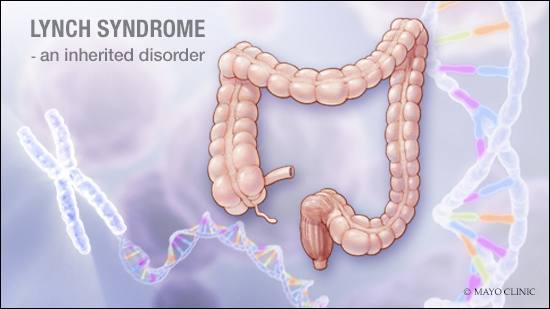-
Cancer
Mayo Clinic Q and A: Lynch syndrome and genetic testing
 DEAR MAYO CLINIC: I am considering undergoing genetic testing to see if I have the gene mutation that causes Lynch syndrome. Because of my family history, I already have regular colonoscopies even though I’m only 41. What would knowing I have the mutation change as far as how I’m monitored for colon cancer?
DEAR MAYO CLINIC: I am considering undergoing genetic testing to see if I have the gene mutation that causes Lynch syndrome. Because of my family history, I already have regular colonoscopies even though I’m only 41. What would knowing I have the mutation change as far as how I’m monitored for colon cancer?
ANSWER: Knowing if you do or do not have Lynch syndrome could be useful to you for various reasons. If you have Lynch syndrome, it will affect your medical care going forward, including the tests you need to monitor for colon cancer, as well as how often you should get those tests. Being aware of Lynch syndrome also can help your family members make decisions about whether they should get tested for the disease.
Lynch syndrome is an inherited disorder that runs in families. If one of your parents carries a gene mutation for Lynch syndrome, there’s a 50 percent chance that the mutation will be passed on to you. About 1 in 200 people has Lynch syndrome.
Lynch syndrome raises the risk of colon cancer. Lynch syndrome also has a tendency to cause colon cancer to occur at an earlier age than it usually does in people who do not have the gene mutation associated with Lynch syndrome.
If you have a positive genetic test for Lynch syndrome, it likely would be recommended that you have colonoscopies more frequently. People with Lynch syndrome typically have colonoscopies every one to two years, with a goal of finding precancerous colon polyps and removing them before they become cancerous. People who have Lynch syndrome and get frequent colonoscopies live longer than those with the disease who do not get the exams as often.
You also may need other testing regularly, such as an upper endoscopy — a procedure used to examine the upper portion of the digestive system, including the esophagus, stomach and beginning of the small intestine.
If you are diagnosed with cancer at some point, knowing if you have Lynch syndrome could improve the outcome of your treatment. Sometimes Lynch syndrome cancer patients do better with surgery or chemotherapy that is different than what typically is prescribed for other cancer patients.
If genetic testing shows you do not have Lynch syndrome, that also would help guide your medical care. For example, if you don’t have the condition, you may be getting colonoscopies more frequently than is necessary.
Another issue to consider is that, if you do have Lynch syndrome, your relatives — including your children, if you have any — also would be at risk for the disease. Having your information may help them plan their future medical care.
As you think about your options, consider working with a genetic counselor to help you make an informed decision. Genetic counselors have completed a master’s degree in genetic counseling and are certified by the American Board of Genetic Counseling Inc. Determining whether genetic testing is right for you can be complicated. A genetic counselor can help you sort through the pros and cons of genetic testing with your individual circumstances in mind.
Talk to your health care provider about your interest in genetic testing. He or she may be able to recommend a local genetic counselor. Or you can refer to the National Society of Genetic Counselors for an online directory that can help you find a genetic counselor in your area. — Dr. Douglas Riegert-Johnson, Gastroenterology and Hepatology, Mayo Clinic, Jacksonville, Florida







